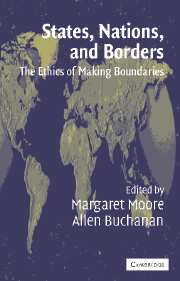Book contents
- Frontmatter
- Contents
- About the Contributors
- Acknowledgments
- 1 Introduction: The Making and Unmaking of Boundaries
- THE JEWISH TRADITION
- THE CONFUCIAN TRADITION
- THE CHRISTIAN TRADITION
- THE NATURAL LAW TRADITION
- THE ISLAMIC TRADITION
- THE LIBERAL TRADITION
- THE INTERNATIONAL LAW TRADITION
- CONCLUSION
- 16 Conclusion and Overview
- Index
16 - Conclusion and Overview
Published online by Cambridge University Press: 24 November 2009
- Frontmatter
- Contents
- About the Contributors
- Acknowledgments
- 1 Introduction: The Making and Unmaking of Boundaries
- THE JEWISH TRADITION
- THE CONFUCIAN TRADITION
- THE CHRISTIAN TRADITION
- THE NATURAL LAW TRADITION
- THE ISLAMIC TRADITION
- THE LIBERAL TRADITION
- THE INTERNATIONAL LAW TRADITION
- CONCLUSION
- 16 Conclusion and Overview
- Index
Summary
The unique insight of this volume is that regardless of whether boundaries are viewed as mere administrative conveniences or as having some intrinsic moral value in our non-ideal world of sovereign, bounded political jurisdictions, people have had to consider the appropriateness of the methods by which boundaries are made or unmade.
This comparative overview is designed to facilitate this comparison by focusing on the typology of boundary-alteration – conquest, settlement, sales/purchase, inheritance, and secession – rather than the principles of each of the traditions.
Conquest
Conquest, in the sense of the forcible annexation and incorporation of territory that is already within the geographical jurisdiction of another state, is viewed by most of the traditions in this volume as a wholly unacceptable means of acquiring territory. However, many of these same traditions, particularly those with a religious basis, accept the legitimacy of territory conquered in a just war (variously defined). The two modern ethical traditions – liberal theory and international law – also condemn conquest as a means of altering territory, and have strongly resisted it, when it has occurred in clear-cut cases. However, beyond the clear-cut cases, international law, and especially liberal theory, have been prepared to countenance external intervention in the affairs of another state, although supporters of the intervention would never describe it as a “conquest.”
The approach to conquest taken in Jewish political and ethical thought is both complicated and contested. One interpretation of the Jewish tradition (Lorberbaum's Chapter 2) focusses on the certain piece of land or territory that is defined in the Bible as the land to which the Jewish people are entitled, as part of a covenant between God and the His People.
- Type
- Chapter
- Information
- States, Nations and BordersThe Ethics of Making Boundaries, pp. 317 - 338Publisher: Cambridge University PressPrint publication year: 2003
- 1
- Cited by

